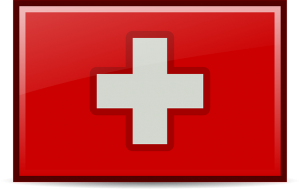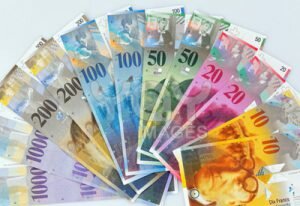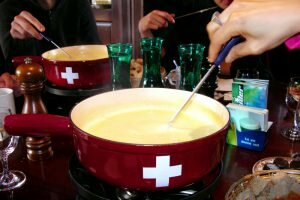
Swiss-German is considerably different from German, especially as it happens in regard to those very phrases which a traveler needs: niceties, greetings, asking for stuff, getting directions, etc. One of the key differences to getting by with Swiss German. For example, “Fine, thank you” is “Guet, merci”; with guet being the German word for good/fine, while merci is from the French “thank you”. In addition, there are many pronunciation differences which separate Swiss-German from either language. For example, the diphthong in Swiss-German “guet” versus the monophthong in High-German “gut”.
Speaking Swiss-German is common for all people living in the Swiss-German part of Switzerland, independent of age or education. For writing, standard German is mostly used, though Swiss-German dialect is particularly popular on informal writing (e.g. in e-mail messages, SMS messages, on Facebook and YouTube etc.). With the ongoing globalization and immigration, mixing Swiss-German dialects with English (quite often even with pseudo English) or speaking so called “Jugo-Deutsch” (German pronounced as immigrants coming from the former Yugoslavia region tend to pronounce it) has also become trendy for youngsters.
Learn Swiss-German now
Table of Contents

- Basics
- Problems
- Numbers
- Time
- Days
- Months
- Colors
- Transportation
- Directions
- Taxi
- Lodging
- Money
- Eating
- Shopping
- Driving
- Other
Basics

- Hello/Hi (informal)
- Hoi!
- Hi, everyone! (informal)
- Hoi zäme!
- Hi (very informal)
- Saluti! / Saletti!
- Hello (formal)
- Grüezi! / Sali! (in areas close to French-speaking Switzerland)
- Hello, Ms./Mr. … (formal)
- Grüezi Frau/Härr …
- Hello, everyone (formal)
- Grüezi mitenand!
- My name is … (formal)
- I heisse …
- My name is … (informal)
- Mi name isch …
- How are you? (informal)
- Wie gaats dir?
- How are you? (formal)
- Wie gaats Ine?
- I’m fine, thanks!
- Mir gaats guet, danke!
- I don’t feel well!
- Mir gaats nöd so guet!
- What about you? (informal)
- Und dir?
- What about you? (formal)
- Und Ine?
- Good morning (informal and formal)
- Guete Morge
- Good evening
- Guete Aabig
Problems

- I lost my wallet!
- Ich han mis Portmone verloore!
- I feel sick/not well/upset
- Ich füel mi schlächt
- Where is the police station?
- Wo isch de Polizeiposchte?
- I have to report something
- Ich mues öppis mälde
- Hospital
- Spitaal
- Is there a hospital nearby?
- Häts da es Spitaal i de Nööchi?
- I am/we are lost!
- Ich bin veloore/mer sind verloore
- Can you please tell me where…..is?
- Chönd Si mir säge wo…..isch?
- train station
- Baanhoof
- taxi station
- Taxistand
- bank
- Bank
- post office
- Poscht/Poschtamt
- hotel
- Hotel
- church
- Chile
- I’m in love
- Ich bi verliebt!
- I love you!
- Ich lieb dich!/ I ha di liab!
Learn Swiss-German now
Numbers

- 1
- äis (counting), äi (marked), e/en/es *unmarked*
- 2
- zwäi
- 3
- drüü
- 4
- vier
- 5
- föif/füüf
- 6
- sächs/säggs
- 7
- sibe
- 8
- acht
- 9
- nüün
- 10
- zää
- 11
- ölf
- 12
- zwölf
- 13
- driizää
- 14
- vierzää
- 15
- füfzää
- 16
- sächzää
- 17
- sibezää
- 18
- achzää
- 19
- nüûnzää
- 20
- zwänzg
- 21
- einezwänzg
- 22
- zwäiezwänzg
- 23
- drüezwänzg
- 24
- vierezwänzg
- 25
- föifezwänzg
- 26
- sächsezwänzg
- 27
- sibenezwänzg
- 28
- achtezwänzg
- 29
- nünezwänzg
- 30
- drissig
- 40
- vierzig
- 50
- füfzig
- 60
- sächzig
- 70
- sibzig
- 80
- achtzig
- 90
- nünzig
- 100
- hundert
- 101
- hundertundäis
- 102
- hundertzwäi
- 1000
- tuusig
Time

- time
- Ziit
- What time is it?
- Was isch für Ziit?
- It is…
- Es isch …
- one o’clock
- äis
- half past twelve
- halbi äis
- quarter to one
- virtel vor äis
- quarter past one
- virtel ab äis
- ten past one
- zää ab äis
- half past one
- halbi zwäi
- three o’clock
- drüü
- four/five/six/seven/eight/nine/ten/eleven/twelve o’clock
- vieri/föifi/sächsi/sibni/achti/nüüni/zäni/elfi/zwölfi
- a.m.
- am Morge
- p.m.
- am Aabig
Days

- Monday
- Mäntig
- Tuesday
- Zischtig
- Wednesday
- Mittwoch
- Thursday
- Donnstig
- Friday
- Fritig
- Saturday
- Samschtig
- Sunday
- Suntig
Months

- January
- Januaar
- February
- Februaar
- March
- März
- April
- April
- May
- Mai
- June
- Juni
- July
- Juli
- August
- Auguscht
- September
- Septämber
- October
- Oktoober
- November
- Novämber
- December
- Dezämber
Learn Swiss-German now
Colors

- Red
- root
- Blue
- blau
- Black
- schwarz
- Green
- grüen
- White
- wiiss
- Yellow
- gälb
- Purple
- violett
- Orange
- orangsch
- Pink
- rosa/pink
- Gray
- grau
Transportation

- Motorcycle
- Töff
- Vespa, Motorbike
- Töffli/ Mofa
- Bicycle
- Velo
- Tram
- Tram
- Bus
- Bus
- Coach
- Räiseggaar
- Train
- Zug
- Airplane
- Flugzüg
- (bus/tram) stop
- Haltestell
Directions

- Where is this bus going to?
- Wo ane faart dä Bus?
- straight ahead
- graad uus
- Left
- links
- right
- rächts
- in front
- vore
- forwards
- voorwärts
- in the back
- hinde
- backwards
- rückwärts
- back
- zrugg
Taxi

- to the ….. hotel please!
- Zum Hotel …… bitte!
- How much does it cost to …, approximately?
- Was choschtets öppe nach …….?
- airport
- Flughafe
- train station
- Baanhoof
- hotel
- Hotel
- I’m in a hurry!
- Ich hans pressant!
- We are in a hurry!
- Mir händs pressant!
- Hurry, please!
- Bitte pressiere!
Learn Swiss-German now
Lodging

- Händ Si no es freis Zimmer?
- Do you still have a vacancy?
- Bis wänn söl ich mich abmälde?
- When do I need to check out?
Money

- Gäld / Baargäld, Stutz (coll.), Stütz (coll.)
- cash, money.
- Isch Baargäld okei? Chan ich mit Baargäld bezale?
- Is cash okay? Can I pay with cash?
- Was choschtet das?
- how much is this/that?
- Z tüür!
- Too expensive! (might be very offensive!)
- Das isch mir e chli z’tüür
- That seems to be rather expensive (more polite phrasing)
- Hät’s no billigeres?
- Do you have something cheaper?
- Chan ich mit Krédigcharte zahle?
- Can I use my credit card?
- Trinkgäld
- Tip
- Trinkgäld gää
- Give a tip
- Ich nim das
- I’ll take/buy it
- Ich möcht öppis anders
- I would like something else.
- Händ Si Suwniir(s)?
- Do you have souvenirs?
- Wo chan ich Gäld wächsle?
- Where can I change money?
- Wo isch de nòòggscht Bankomaat?
- Where is the closest ATM?
Eating

- En guete!
- Enjoy your meal!
- Schoggi
- Chocolate
- Proscht, Pröschtli, Prosit!
- Cheers
- Herdöpfel / Erdöpfel
- Potato(es)
- Rüebli
- Carrot(s)
- E Stange, es Chliises
- A small glass of beer
- En Chübel, es Groosses
- A big glass of beer
- Es Glaas Wii
- A glass of wine
- Es Glaas Roote (Wii)
- A glass of red wine
- Es Glaas Wiisse (Wii)
- A glass of white wine
- Oktoobertee
- wine (slang/coll.)
- Chriesi
- cherry/cherries
- Chueche/Flade
- pie, cake
- Gipfeli
- croissant(s)
- Milchkafi, Schale
- cafe au lait
- Kafi grèèm
- coffee
- Bier
- beer
- Suufe
- to drink beer/alcohol
- Schwiizer Chääs
- Swiss cheese
- Rööschti
- mashed, fried potatoes (a Swiss speciality)
- Fongdü
- Fondue (melted Swiss cheese in a bowl, a Swiss speciality, usually eaten during winter-time only)
- Ragglèt
- melted, roasted Swiss cheese (a Swiss speciality, usually eaten during winter-time only)
- Gschnätzlets
- Cut veal
- Züri-Gschnätzlets
- Cut veal, served with Röschti, speciality of Zurich
- Ich würdi gärn e Schwiizer Spézialitäät probiere
- I’d like to taste a Swiss speciality
- Was chönd Si mir empfääle?
- Can you recommend something?
- En Apéritiv
- a starter
Shopping

- Poschte, iichaufe
- Go shopping
- Schoppe
- Shop around
- Wievil choschtet …?
- How much does … cost?
- Gits en Rabatt? Gits en Ermäässigung?
- Is there a discount?
- Wo häts …?
- Where can I find …?
Driving

- driving a car
- Auto faare
- How do I get to the freeway/motorway?
- Wie chum ich zur Autobaan?
- Gasoline/Petrol
- Benziin
- driving license
- Faaruswiis
- traffic rules
- Verchersregle
- accident
- Unfall
- police officer
- Polizischt
- right-hand traffic/driving
- Rächtsvercher (way of driving in Switzerland)
Other

- Händ er de … kaputt gmacht?
- Did you destroy the …?
- Gseet uus wi e gstorbeni Chatz
- Looks like a dead cat.
- Mis Luftchüssiboot isch voller Aal
- My hovercraft is full of eels.
- Heb dini Schnurrä!
- Shut up!
- Hopp Schwiiz !
- Go Switzerland ! (used to encourage the national team in various sports events)

If you know all these phrases well you are already on a pretty fantastic start with Swiss-German. To make studying more fun, efficient and practical we created an online course you can buy by clicking the button below. It covers all the content mentioned here, over 50 high quality learning videos with numerous tips, tricks and cultural background information. We tell you exactly when to use which words and how to pronounce them perfectly — of course, we made everything as practical as possible so you can directly go out and apply everything you learned. The best time to start, is just right now!
Learn Swiss-German now
Wikipedia-Artikelnamen hier eintragen
aus der freien Enzyklopädie
Wikipedia und steht unter der
GNU-Lizenz für freie Dokumentation. In der Wikipedia ist eine
Liste der Autoren verfügbar.













 Now we’re at the interesting topic of Swiss German “em Schwiizerdütsch”. There are in fact a variety of different dialects in different cantons, and some of them are more difficult than others. However, if you really want to learn the local language there is absolutely nothing in this world that is going to stop you.
Now we’re at the interesting topic of Swiss German “em Schwiizerdütsch”. There are in fact a variety of different dialects in different cantons, and some of them are more difficult than others. However, if you really want to learn the local language there is absolutely nothing in this world that is going to stop you.



 „Mi persönliche Tipp, Zermatt oder Adelboden.“
„Mi persönliche Tipp, Zermatt oder Adelboden.“
 We are sure with these tips you will absolutely enjoy your day in the mountains. Your Swiss German language skills will certainly come handy.
We are sure with these tips you will absolutely enjoy your day in the mountains. Your Swiss German language skills will certainly come handy.